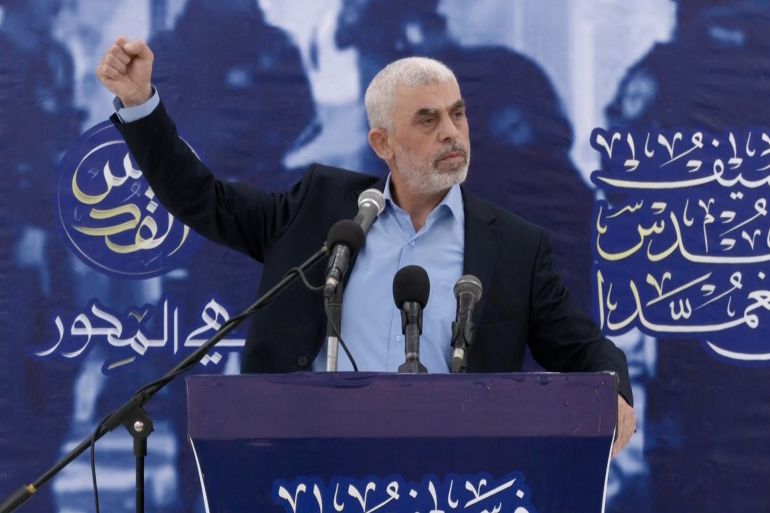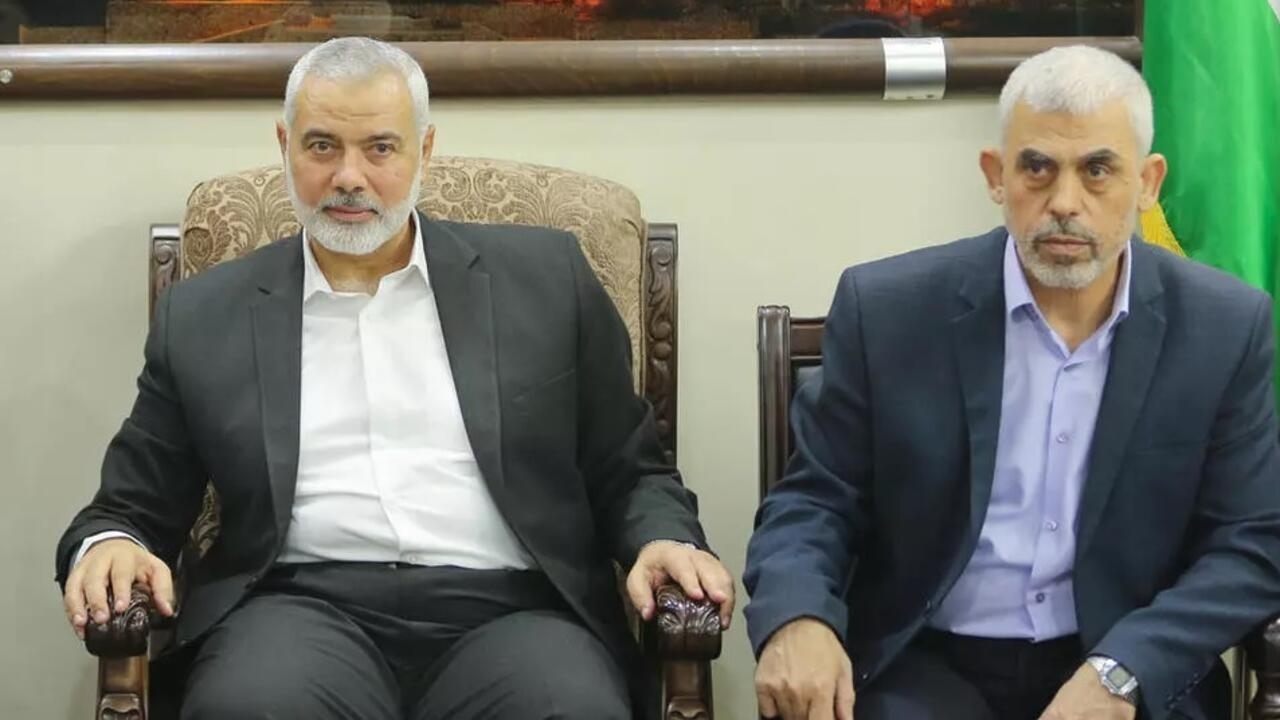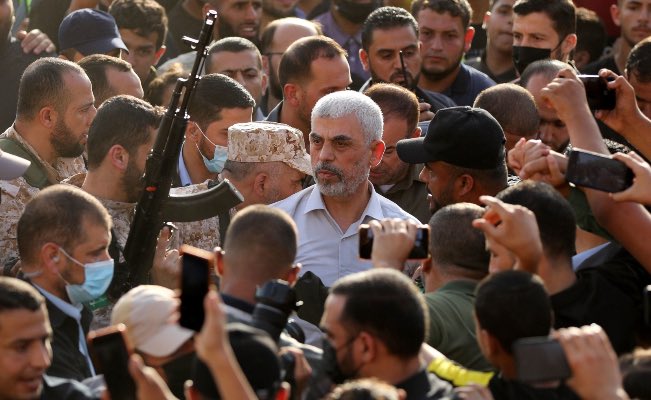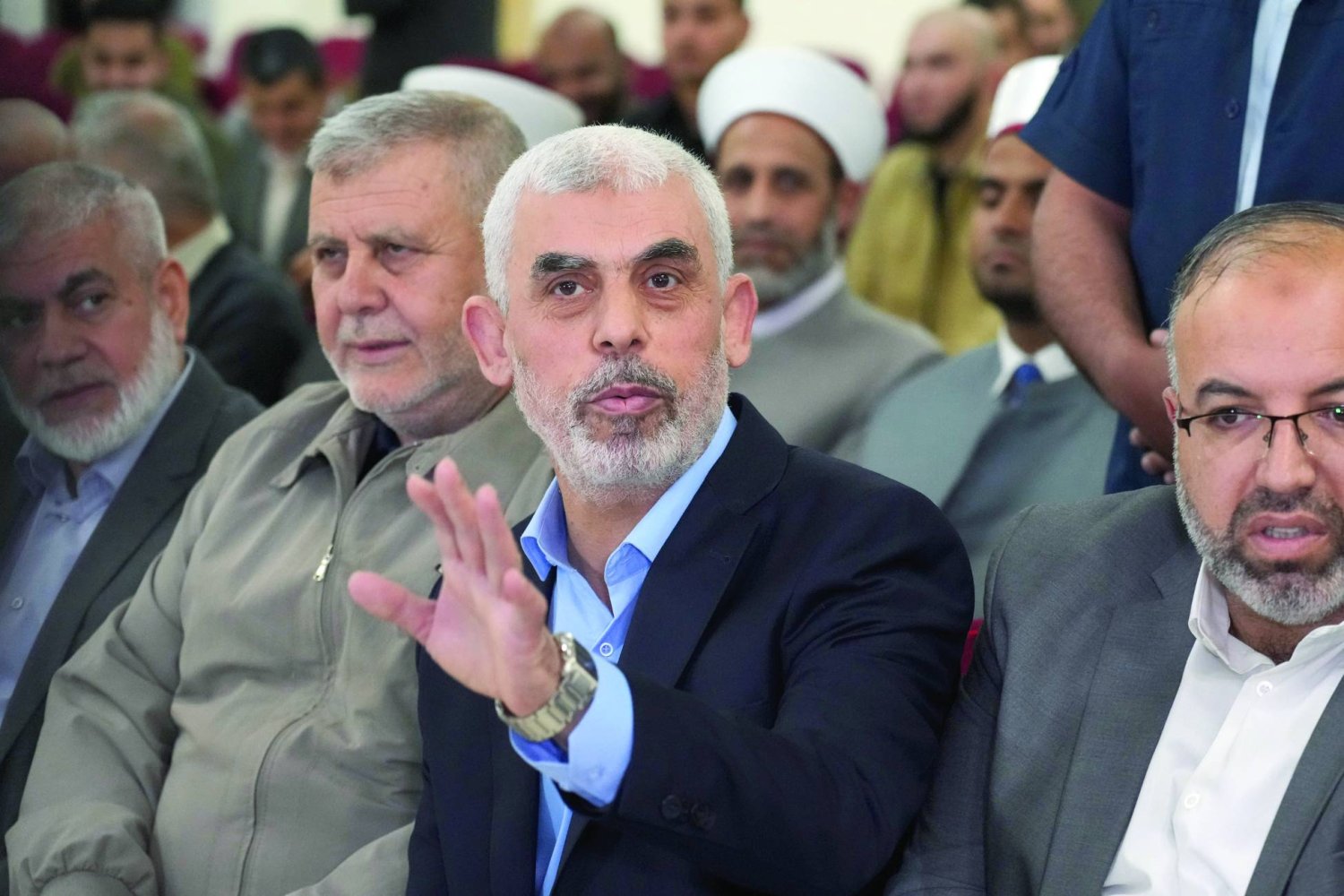
SANA'A August 11. 2024 (Saba) - After more than ten months of receiving a sudden slap, which put it in a state of shock and delirium from which it has not been able to recover until this day, the Zionist enemy has received a new resounding slap in its face and the face of its supporters and allies with the announcement of the heroic leader Yahiya Sinwar as head of the political bureau of Hamas Movement, no less important than the previous slaps.
While it is assumed that the Islamic Resistance Movement received a severe blow with the assassination of its leader - according to the Zionist perceptions - the selection of Sinwar as Hamas leader caused a heavy shock to everyone who was elated with joy at the assassination of the late, Martyr Ismail Haniyah. It represented a clear challenge to the usurping entity and its supporters and aides, that the blows received by the resistance only increase its determination, stubbornness and persistence in waging the war further than the enemies of the Palestinian people can imagine.
Given the fact that Sinwar represents a symbol of humiliation for the Zionist enemy army and its criminal Prime Minister Benjamin Netanyahu, in the form of Al-Aqsa Flood Battle and the subsequent war that continues to this day, in which not a single Zionist goal has been achieved to this day, and in which the Palestinian resistance has inflicted unprecedented losses on the military, political, media and economic system of the Zionist enemy, losses that cannot be restored in the near future.
As for reactions in Palestine, all the Palestinian resistance factions blessed the election of leader Yahiya Sinwar as head of the political bureau of Hamas, to replace the martyred leader Ismail Haniyah. The stated that his election is a strong message to the Zionist enemy that Hamas is still strong and cohesive, and capable to overcome hardships.
Following the announcement of Sinwar as the movement's leader, the Zionist enemy did not hide its disappointment, as its media and officials confirmed this feeling; the Zionist Broadcasting Authority said: Sinwar's appointment is surprising and a message to "Israel" that he is alive and that Hamas's leadership in Gaza is strong, standing and will remain.
But the so-called Israeli Foreign Minister Yisrael Katz said: The appointment of the murderer Sinwar as the leader of Hamas is another reason to eliminate him and erase the memory of this organization from the face of the earth.
For his part, Avi Issacharoff, Middle East affairs analyst for the Times of Israel newspaper, said: "Hamas has chosen the most dangerous person to lead it." The official Zionist channel "Kan" said: The selection of Sinwar shows that Hamas in Gaza is still strong.
It is noteworthy that the Zionist enemy considers Sinwar the engineer of the heroic "Al-Aqsa Flood" operation on October 7, 2023, which inflicted human and military losses on it and shook the image of its intelligence and security services in the eyes of the world. So it announced that his liquidation is one of the main objectives of its current war on Gaza.
Sari Arabi, a writer and political analyst, said that choosing Sinwar as the head of Hamas Movement has logical dimensions at this stage for subjective and objective reasons. In terms of subjective reasons, Sinwar is the deputy head of the political bureau of Hamas, in addition to being one of the historical leaders who founded the movement since its inception.
The objective reasons relate to responding to the Zionist enemy that thought it could create a state of chaos and disintegration within the Movement, Arabi added in an intervention on Al Jazeera Network. "But the movement responded that it is cohesive in such a way that it chooses a president from inside Gaza Strip, which represents another symbolism with a moral dimension. The symbolism of the leader's presence within the Strip represents a practical application of the idea of the resistance's unity with the Palestinian people and that they are experiencing the pain of the people of Gaza through martyrdom, arrest, and persecution.
For Shadi Sharaf, expert on Zionist affairs, the selection of Sinwar constitutes "a new slap in the face of the Zionist military intelligence after the slap of October 7," i.e. the "Al-Aqsa Flood" operation.
He considered that this selection constitutes a challenge to the security system and to all the military strikes and war of extermination waged on Gaza, as "the appointment of Sinwar confirms that Hamas's direction is still towards resistance and adherence to this option because Sinwar is the one leading the negotiations and the mastermind of the Al-Aqsa Flood attack."
He recalled that Sinwar enjoys wide popularity not only among Hamas but also among many factions present in the Gaza Strip. He noted that Sinwar "was able to re-crystallize and formulate relations with all factions in a way that was very acceptable compared to previous periods."
Who is Leader Yahiya Sinwar?
Yahiya Sinwar, head of the Islamic Resistance Movement (Hamas), was born in 1962. He was arrested by the Zionist enemy several times and sentenced to four life sentences before being released in a prisoner swap deal in 2011. He returned to his activity in leading the Izz ad-Din al-Qassam Battalions (the military wing of Hamas).
He was elected as the movement's leader in the Gaza Strip in 2017 and again in 2021, and in 2024 he was elected as the head of the movement's political bureau, after the Zionist enemy assassinated his predecessor, Ismail Haniyah.
Yahiya Ibrahim Hassan al-Sinwar was born on October 7, 1962 in the Khan Younis refugee camp, south Gaza Strip. His family was displaced from the city of Majdal in the northeast of the Strip after Israel occupied the city following the Nakba in 1948 and changed its name to Ashkelon.
He received his education at Khan Younis Secondary School for Boys, before joining the Islamic University in Gaza and graduating with a bachelor's degree in Arabic Studies. He grew up in difficult circumstances and was affected in his childhood by the repeated attacks and harassment of the Zionist enemy against the residents of the camps.
On November 21, 2011, he got married to Samar Muhammad Abu Zamar, a Gazan woman who holds a master's degree in the fundamentals of religion from the Islamic University of Gaza. He has one son named Ibrahim.
Yahiya Sinwar had prominent student activity during his university studies, as he was an active member of the Islamic Bloc, the student branch of the Muslim Brotherhood in Palestine.
He served as Secretary-General of the Technical Committee and then the Sports Committee in the Student Council at the Islamic University of Gaza, Vice-President of the Council and then President of the Council.
Student activity helped him gain experience and acumen enough to assume leadership roles in Hamas Movement after its foundation in 1987 during the Intifada of the Stones.
In 1986, he founded with Khaled al-Hindi and Rawhi Mushtaha - at the behest of the movement's founder Sheikh Ahmed Yassin - a security apparatus called the Jihad and Call Organization, known as "Majd".
The mission of this organization was to uncover and pursue agents and spies of the Zionist enemy, in addition to tracking officers of the Zionist intelligence and security services. This organization soon became the first nucleus for developing the internal security system of the Hamas Movement.
He was arrested for the first time in 1982 due to his student activities when he was 20 years old. He was placed under administrative detention for four months and was re-arrested a week after his release. He remained in prison for six months without trial. In 1985, he was arrested again and sentenced to eight months.
On January 20, 1988, he was arrested again and tried on charges of leading the kidnapping and killing of two Zionist soldiers, and killing four Palestinians suspected of collaborating with the Zionist enemy. He was sentenced to four life sentences (426 years).
During his detention, he led the Supreme Leadership Committee of Hamas prisoners for two organizational terms, and contributed to managing a confrontation with the enemy prison service during a series of hunger strikes, including the strikes of 1992, 1996, 2000 and 2004.
He was transferred between several prisons, including Majdal, Hadarim, Sabaa and Nafha, and spent four years in solitary confinement, during which he suffered from stomach pains and began vomiting blood while in solitary confinement.
He tried to escape from prison twice, the first time when he was detained in Majdal Prison in Ashkelon, and the second time while in Ramla Prison, but his attempts failed.
In Majdal Prison, he managed to dig a hole in the wall of his cell using a wire and a small iron saw. When only the outer shell of the wall remained, this layer collapsed and revealed his attempt, so he was sentenced to solitary confinement. In the second attempt in Ramla Prison, he managed to cut the iron bars of the window, and prepare a long rope, but he was discovered at the last moment.
During his imprisonment, he suffered from health problems, including constant headaches and a high fever. Thanks to great pressure from inmates, he underwent medical tests that showed a spot of frozen blood in his brain, and he underwent a brain surgery that lasted seven hours.
During his imprisonment, he was deprived from family visits. The day after his release, his brother stated that the Zionist enemy prevented him from visiting Yahiya for 18 years, and that his father visited him only twice in 13 years.
Yahiya Sinwar invested his 23-year imprisonment in reading, learning, and writing. During this time, he learned the Hebrew language and delved into understanding the Zionist mentality. He wrote a number of books and translated in political, security, and literary fields.
Yahiya Sinwar was released in 2011. He was one of more than a thousand prisoners who were freed in exchange for the Zionist soldier Gilad Shalit, in what was called the "Wafa al-Ahrar" deal. The deal was concluded after more than five years that Shalit spent in captivity in Gaza, and Israel during its aggression against the Strip in late 2008 failed to free him from captivity.
After leaving prison, Sinwar was elected a member of the political bureau of Hamas Movement following internal elections in 2012. He was also in charge of the military wing, the Izz ad-Din al-Qassam Battalions, and was responsible for coordinating between the movement's political bureau and the leadership of the Battalions.
He played a major role in coordinating between the political and military sides of the Movement during the Zionist aggression on Gaza in 2014. After the end of this aggression, he conducted comprehensive investigations and evaluations of the performance of field leaders, which resulted in the dismissal of prominent leaders.
His house was bombed several times. It was bombed and completely destroyed by Zionist enemy aircraft in 2012, during the aggression on the Gaza Strip in 2014, and then in Zionist air strikes in May 2021.
Commander Sinwar is described as a cautious figure, who does not speak much, rarely appears in public, possesses high leadership skills and has a strong influence on members of the movement.
After Al-Aqsa Flood operation, Yahiya Sinwar became the number one wanted by the Zionist entity, in addition to Muhammad Deif, the commander-in-chief of the Izz ad-Din al-Qassam Battalions.
Eliminating Hamas's leader has become the most important strategic goal of the Zionist military operation in the Gaza Strip, or the so-called "Iron Swords", as Zionist officials consider him the mastermind behind the attack of October 7, 2023.
On May 20, 2024, the Prosecutor of the International Criminal Court, Karim Khan, said he had submitted a request to the court to issue an arrest warrant against Netanyahu and his Minister of War, Yoav Gallant, in addition to Sinwar, Deif, and Haniyah, on charges of committing war crimes and crimes against humanity following the events of October 2023.
Commenting on this decision, Sami Abu Zuhri, a leader in Hamas Movement, told Reuters: The decision of the International Criminal Court to request the issuance of an arrest warrant against three leaders of the Palestinian movement "equalizes the victim with the executioner", noting that the court's decision encourages Israel to continue its genocidal war.
K.N


